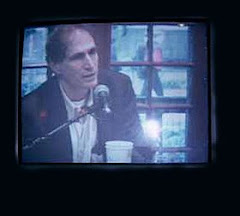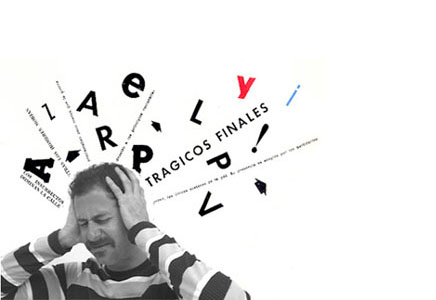 LISTEN TO THE SHOW
LISTEN TO THE SHOWA list of Bohemian pleasures. Ted Berrigan's "3 Pages" is a list poem, surely. He mentions ten things he does every day (including "read lunch poems," surely a reference to Frank O'Hara's book of that title) but the PoemTalkers - Randall Couch, Linh Dinh and special guest erica kaufman - had trouble counting them. We got to nine, and pondered. erica then suggested that she "would count 'NOT ENOUGH' as being ten." The last line of the poem. Those American things (heart attack, Congressional medal, second home) that immediately precede the last line...well, for Berrigan, they don't add up.
So our PoemTalk poem this time is a summing-up poem (Berrigan hinted as such a quality) that sums up by affixing "not enough" to the total. We four liked this sort of life, were turned on by it. Oh, set us down by the waters of Manhattan.
Aside from O'Hara there are further literary references here in this poem about leading the literary life. By the Waters of Manhattan is the novel of another important New Yorker poet, Charles Reznikoff. Al says: "'NO HELP WANTED' as a placard turns around the usual, 'You're an American boy, get a job.'" Ahabian resistance to progress and accumulation and reason, in a world of Starbucks. We found the rhetoric of folk song here, and we saw indeed deep traces of Moby Dick's irrational-rational aestheticism. "Hunting for the Whale" is one of the "ten" things a Berrigan poem does for us every single day.
For the purposes of introducing the idea of the list poem to people not used to seriatic ways of modern and contemporary poetry, we agree that this poem is the perfect instance with which to start. "Teachable" in that sense.
The poem is dedicated to Jack Collom, and our Linh Dinh phoned Jack himself for his thoughts. Listen to PT #5 and find out what Jack told Linh.
Recorded in the Arts Cafe of the Kelly Writers House in Philadelphia, PoemTalk #4 was produced by Al Filreis, edited and engineered by Steve McLaughlin. PennSound's Ted Berrigan page is a treasure trove of great recordings, including the famous 1981 reading of his Sonnets in their entirety. Our poem can be heard here. The poem was read on the radio show "In the American Tree" in 1978, during an interview conducted by Lyn Hejinian and Kit Robinson on KPFA, Berkeley.
"3 Pages" was published in Berrigan's book Red Wagon and here is a link to the text.
























5 comments:
Great discussion. Also, my copy of Reznikoff's By The Waters of Manhattan is his Selected Verse (New Directions)--and not a novel. Is there another?
By the Waters of Manhattan: An Annual (New York: Charles Reznikoff, 1929)
By the Waters of Manhattan (New York: Charles Boni, 1930)
The title was re-used later. - Al
Hey! Great episode!
Did the discussion of Berrigan's interview with Cage miss the fact that the interview was completely fabricated by Berrigan, with no input from Cage?
From Berrigan's page at Poetryfoundation.org (there are other, off-line sources corroborating this as well):
"His control in doing this was in fact so good that he was able to write an 'interview' with John Cage, whom in fact he had never met, which was selected by an unwary George Plimpton as the best interview of the year for National Literary Anthology."
I'm sure someone else can fill in the details better than I can, but as it goes: The prize money from the National Literary Anthology was to be split between Berrigan and Cage, but having taken no part, Cage was hesitant to take his half and asked whether Berrigan was for him or against him. When he was assured that Berrigan was in fact for him and had used Cagian compositional methods to fabricate the interview, Cage insisted that the entire sum be given to Berrigan.
Thanks, m.m.! I love the "interview" even more now! If you don't mind, I'll add a note about this to the blog proper. - Al
Sounds to me the poem shows how what is supposed to be "enough," as the sum and expected end or success of a life, can never be attained without what it's not supposed to be, the Everyday as "moments of being," simple and transcendent. Also, there will never be "enough" things you can possibly say or do to confine any one life to those moments because it would be death otherwise, no change, no process.
Post a Comment